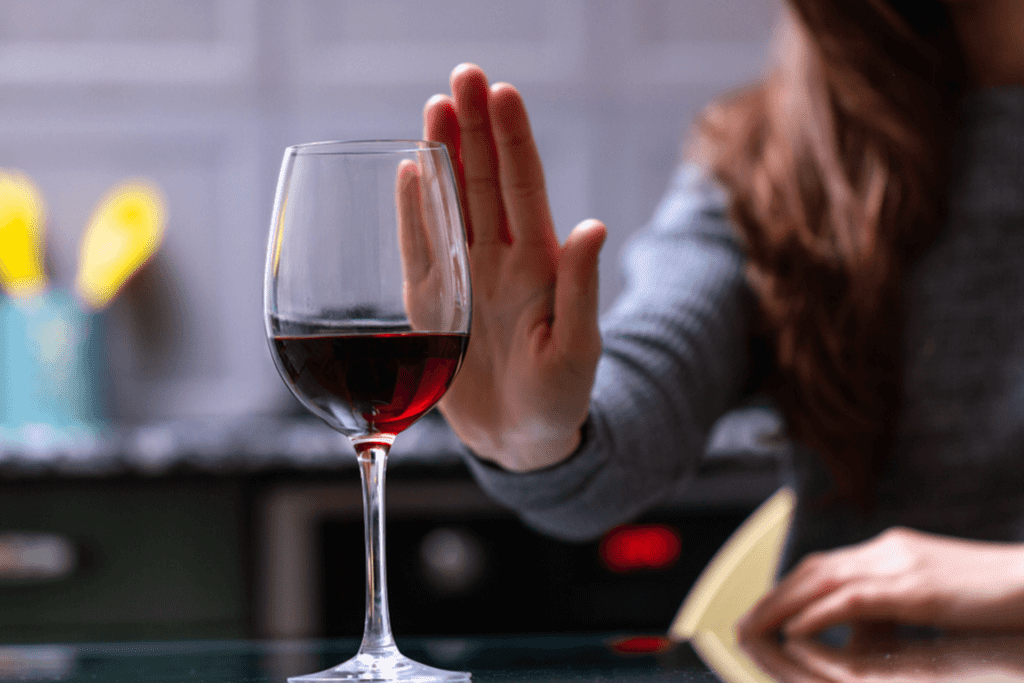Learning how to stop drinking alcohol is less challenging than you might imagine.
SAMHSA data shows that 28.5 million adults in the U.S. have alcohol use disorder and that fewer than 10% of those connect with professional treatment. Fortunately, although there is no cure for alcoholism, the condition typically responds positively to evidence-based treatment.
Alcohol might be socially acceptable, but it is also the most commonly abused addictive substance in the United States.
For those unable to drink alcohol in moderation, the consequences of alcohol abuse can be damaging and wide-reaching. The sustained abuse of alcohol can also lead to physical dependence and addiction.
Oftentimes, people turn to alcohol as a means of coping with stress, depression, anxiety, or insomnia. Regrettably, self-medicating those symptoms with alcohol will provide nothing but short-term relief. Over time, the existing problems are likely to worsen with the introduction of a new problem in the form of alcohol use disorder.
Even moderate alcohol consumption can leave you feeling mentally foggy and physically sluggish. Additionally, the more alcohol you consume, the greater the likelihood of triggering the following adverse outcomes:
- Conflict in your closest relationships.
- Increased feelings of irritability, anxiety, and depression.
- Insomnia and interrupted sleep patterns.
- Memory problems.
- GI and digestive issues.
Discovering how to stop drinking alcohol or how to moderate your consumption will reduce your risk profile for various short-term and long-term health risks, both physical and psychological.
HOW TO STOP DRINKING ALCOHOL
Whether you want to know how to stop binge drinking during the holidays, how to stop drinking beer, how to stop drinking completely, or if you might be a functioning alcoholic, things can initially seem confusing. To cut through this confusion, first make an honest assessment of your relationship with alcohol.
Start by considering your reasons for drinking alcohol. Do you use alcohol as a coping mechanism for any physical or mental health issues? If so, this is inadvisable.
Keeping an accurate record of all the alcoholic drinks you consume in one week will show you the extent of any alcohol abuse in black and white, written in your own handwriting. This can help reinforce the need to consider addiction treatment.
Do you often intend to have just a couple of drinks but then feel unable to stop drinking until you are intoxicated? This is one of the criteria for alcohol use disorder and a clear indication that control over alcohol consumption is slipping from your grasp.
Making an honest appraisal of your drinking habits will help you to determine whether you have a drinking problem, and if so how you should best fight back. How can you achieve this?

TIPS TO STOP DRINKING ALCOHOL
Here are five simple ways to start eliminating alcohol from your life:
1) PRIORITIZE SELF-CARE
If you are ready to stop drinking, the road to recovery can be challenging and stressful. To maximize your chances of quitting alcohol successfully, focus on essential self-care.
- Stay hydrated by drinking small glasses of water throughout the day.
- Eat lots of healthy whole foods with protein from good sources and complex carbs for energy. Minimize your consumption of processed foods.
- Aim for thirty minutes of daily aerobic exercise.
- Practice sleep hygiene to increase your chances of getting seven to nine hours of sleep each night.
- Journal to offload your thoughts, feelings, concerns, and frustrations about alcoholism and recovery.
- Spend more time doing things you once enjoyed.
2) VOICE YOUR CONCERNS TO TRUSTED LOVED ONES
If you are still not committed to recovery even though you acknowledge the existence of problematic drinking patterns, voicing your intentions to loved ones can help you to strengthen your motivation.
Open up to trusted friends or family members and you will almost certainly find that your loved ones are relieved you are ready to engage with treatment. You will also likely find people willing to help you get the help you need – more on that below.
3) REFRAME YOUR THOUGHTS ABOUT GIVING UP ALCOHOL
If you view sobriety as a sacrifice, you are liable to struggle until you relapse. By viewing sober living through a different lens, you can make things easier on yourself as you initiate significant changes to your lifestyle.
Rather than giving something up, you are removing a rogue and problematic element from your life when you quit drinking. By reframing the way you view addiction recovery, you can more readily embrace the many positives of sobriety.
4) SWITCH UP YOUR ROUTINE AND YOUR ENVIRONMENT
If alcohol is central to your routine, drinking become more of an automatic response than a considered choice. This is further inflamed if you use alcohol as a coping mechanism.
Remove all alcohol from the house. Minimizing temptation is a valuable strategy during the initial phase of giving up alcohol.
Find yourself a new drink to replace alcohol as the default option.
Inject some variety into your daily routine. Rather than instinctively drinking alcohol, spend more time with loved ones or doing the things you were once passionate about.
Recovery from alcohol addiction is a lifelong journey not a time-limited event. The more effectively you can recalibrate your life, the more efficiently you can transition from active alcohol addiction to ongoing sobriety.
5) BE PATIENT, PERSISTENT, AND PREPARED FOR RELAPSE DURING RECOVERY
Research shows that relapse rates for alcoholism are somewhere between 40% and 60%, rates in line with those of other chronic health conditions.
If you quit drinking but subsequently relapse, use this is a learning opportunity and re-engage with treatment. Relapse is not a sign that treatment is not working, but rather an indication that the treatment plan needs adjusting.
HELPING SOMEONE ELSE
If you have a loved one who appears to have a problem with alcohol abuse, you should discover as much as possible about alcohol addiction and recovery.
Alcoholism – clinically described as alcohol use disorder – is a chronic and relapsing disease characterized by compulsive alcohol consumption in the face of obviously negative outcomes. By understanding this, you can better understand why your loved one appears to continue abusing alcohol despite the consequences.
You should also research the best treatment methods for alcoholism. Inpatient rehab is usually recommended for more severe alcohol use disorders, for dual diagnosis (addiction and co-occurring mental health condition), and for those with unstable or unsupportive home environments. Outpatient rehab can work well for those highly committed to sobriety and for those with milder alcohol use disorders.
HOW TO GET SOMEONE TO STOP DRINKING
Follow this simple framework to help edge an addicted loved one closer to recovery:
- Listen carefully and non-judgmentally
- Minimize conflict
- Avoid enabling your loved one’s addiction
- Help your loved one get the help they need at inpatient or outpatient rehab
LISTEN CAREFULLY AND NON-JUDGMENTALLY
Do not harass and pressure your loved one into heading to rehab. Instead, listen to them without judgment or acrimony.
Encourage your loved one to open up to you about their experiences with alcohol abuse, listening rather than waiting for an opportunity to speak. You may find they are surprisingly amenable to the idea of engaging with treatment.
MINIMIZE CONFLICT
If a close loved one is addicted to alcohol, this is almost certain to introduce stress into the relationship.
Shift your perspective and focus on connecting your loved one with the help they need now rather than continuously rehashing the past. Stress is one of the strongest triggers for substance abuse, so do all you can to eliminate conflict at home.
AVOID ENABLING YOUR LOVED ONE’S ADDICTION
Do you engage in any of the following behaviors?
- Putting the needs of your loved one about your needs.
- Taking responsibility for the decisions and behaviors of your loved one.
- Refraining from speaking about your feelings.
- Making excuses for the actions of your loved one.
- Staying in the relationship because you fear abandonment.
If so, these are signs of co-dependency, and you could be enabling your loved one’s alcohol addiction. Be supportive but without making it easier for your loved one to continue drinking.
HELP YOUR LOVED ONE GET THE HELP THEY NEED AT INPATIENT OR OUTPATIENT REHAB
To ensure your loved one has the best chance of long-term sobriety, you should help them choose an appropriate alcohol rehab. Here, they can engage with treatment at the right level of intensity, creating a strong base for sustained sobriety. Shortcut that process by reaching out to Gratitude Lodge.

ALCOHOL REHAB AT GRATITUDE LODGE
Whether you or a family member has alcohol use disorder, we can help you at Gratitude Lodge, even if you have severe alcoholism.
We have three locations throughout California – at San Diego, Newport Beach, and Long Beach – offering luxury residential rehab for all types of addictions. By committing to a course of inpatient treatment, you can focus on building a firm foundation for sobriety in an environment free of distractions, stigma, and triggers for alcohol abuse.
If you have alcohol use disorder and a co-occurring mental health condition like depression or anxiety, our dual diagnosis treatment program allows you to address both conditions simultaneously.
Alcohol use disorder usually responds favorably to a combination of MAT (medication-assisted treatment), psychotherapy, and counseling. You will have access to these interventions here at Gratitude Lodge. Additionally, you will attend daily meetings, a 12-step immersion program, and holistic therapy sessions.
For immediate assistance and help to stop drinking today, call admissions at 800-994-2184.




























